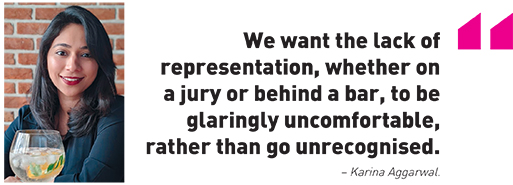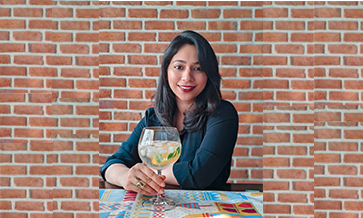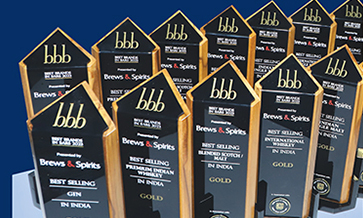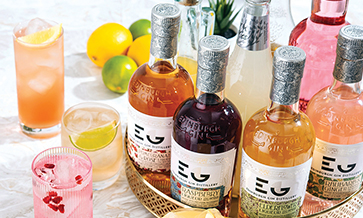There is a lot of diversity at the moment in all walks of the Indian alcobev space, in the form of woman entrepreneurs (from spirits to syrups), mixologists, brand ambassadors, brewers, distillers, bar owners and sommeliers.
Yet, from the perspective of absolute numbers, women and other minorities are still miniscule. In fact, there is no public data available from industry bodies on the number of women in the work force across bars and restaurants in India.
The idea of an Association for eQuality for the Under-represented in the Alcobev industry (AQUA) thus sprang to the mind of Karina Aggarwal, a drinks industry brand consultant, educator and founder of Gigglewater Beverage Concepts. She is also Vice-President of Indian Craft Spirit Co., makers of Terai Gin.
Karina recently roped in Minakshi Singh, co-owner of Gurugram’s Cocktails and Dreams Speakeasy and Delhi’s Sidecar, as a collaborator in this initiative. The core objective is to increase the representation of women and other minorities in the Indian alcobev industry. Karina and Minakshi define this as anyone who earns a direct living from working with alcoholic beverages.
AQUA is structured, Karina says, taking into account “the collective experiences of the kind of issues and biases that a woman faces in this industry. We’ve noticed patterns that hinder brands and bars from hiring a diverse workforce. AQUA is attempting to be an actionable solution to a lot of those concerns.”
Awareness in the Western world, with reference to the importance of diversity in all spheres of life, is rising. In India also, it should appear as an aberration if a bar or restaurant does not at least have one woman in a significant position.
“At the end of the day we want the lack of representation – whether on a jury or behind a bar – to be glaringly uncomfortable, rather than unrecognised, as it is now,” says Karina. “But we’re big believers in merit. We’re not saying that just because you belong to the minority, you should get everything handed to you.”
Minakshi says issues could be as basic as separate toilets in the workplace or uniforms for women. It could be the height of the bar counter, or the prejudice faced from neighbours who wonder about a woman’s late hours of work.
Presently there are a number of women in positions of authority who can help bring about the desired changes. Both Karina’s and Minakshi’s track records and networks also make it far easier for them to open doors now than it might have been a few years ago.
Education is the most critical initiative that the two plan to execute. They will partner with like-minded beverage schools in the country (for starters in Delhi, Mumbai and Bangalore) to identify and place via scholarship 15-20 students who are interested in exploring the space but lack the means to educate themselves.
“This bit is skill-oriented. It is important to prepare them on what being a woman in the industry could possibly entail. There are many conversations that we don’t have like exposure to, such as negotiating skills, a woman’s rights in a workplace, effective grievance redress, etc.,” says Minakshi.
Education will be accompanied by mentorship from seniors (male or female). “Once you’re in this space, it is important not to become driftwood. You must have a rudder, someone who can guide you and steer you,” Karina adds.
A second part of this is to have education at a bar or property level. AQUA wants to build safe working places and practices, ensuring that partner bars are compliant with sexual harassment and sensitisation training requirements. Bars will also have access to AQUA’s hiring database across skills and experience levels.
“Finally, we plan to have conferences, mixers, events and competitions – fun stuff. We are in the business of alcohol after all!” the duo emphasises. To know more, or to support the AQUA initiative, reach out to Karina or Minakshi, or write to aquaforindia@gmail.com.















